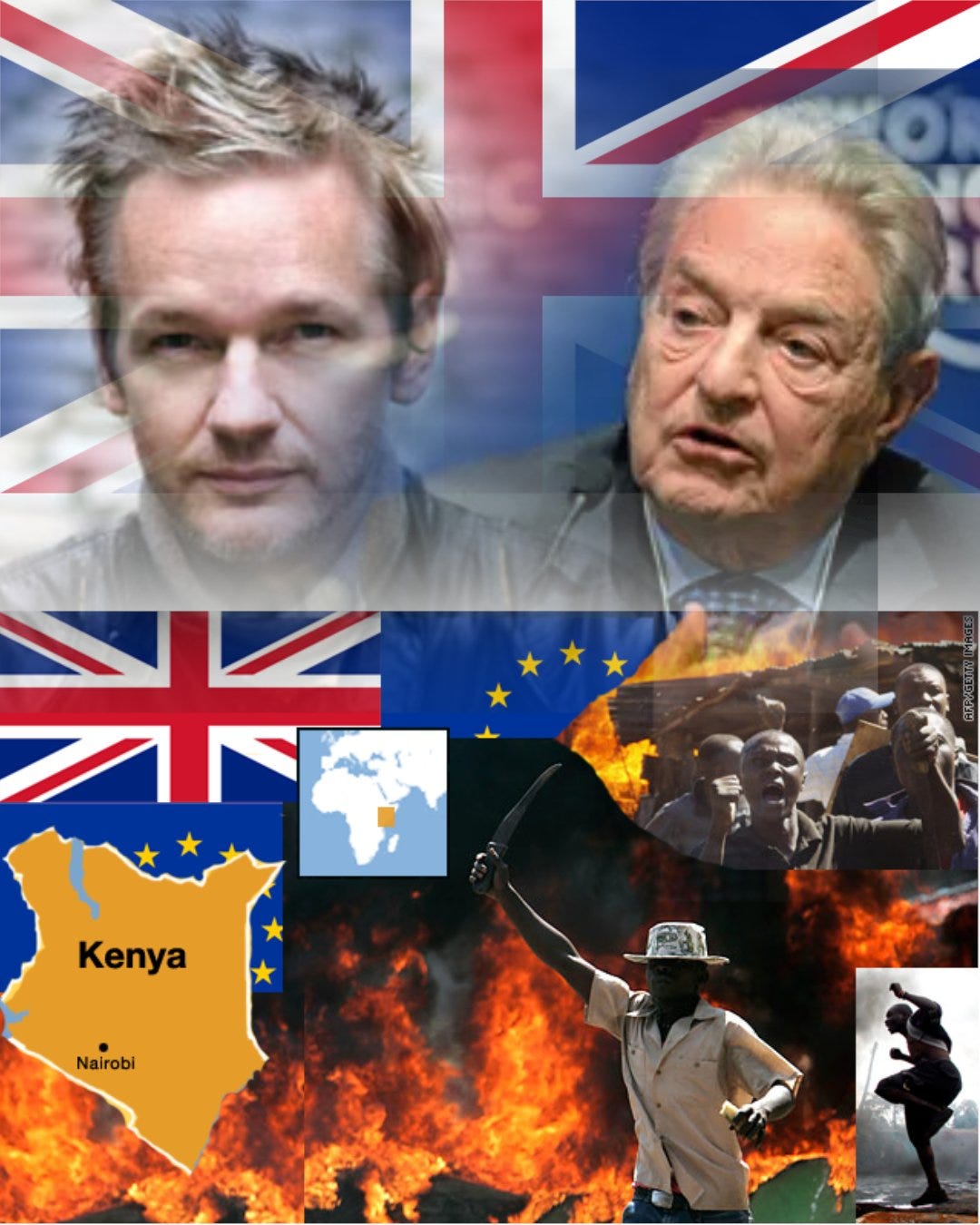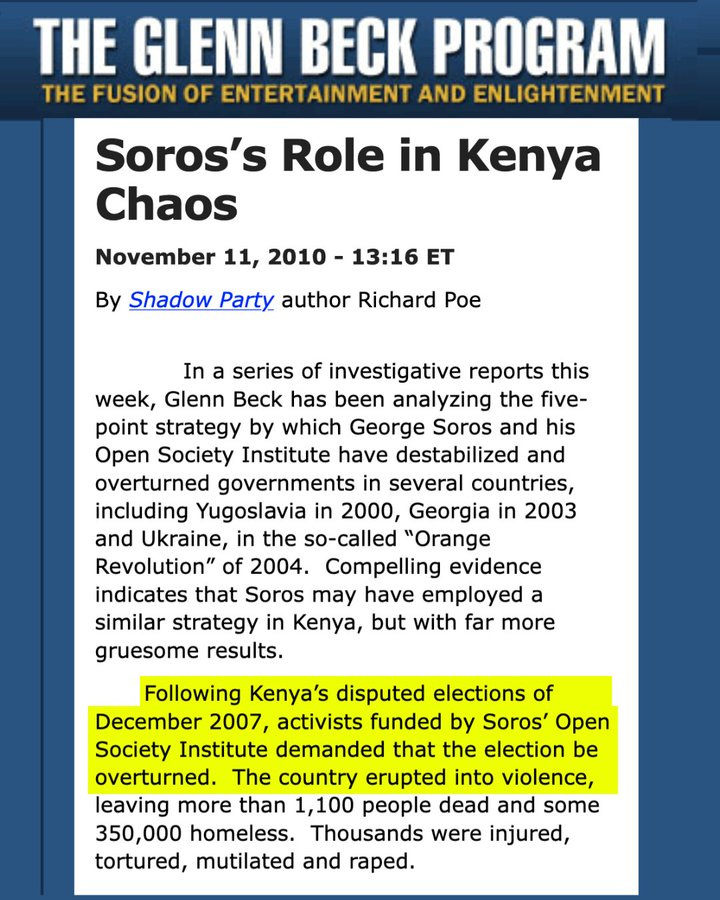How the British Invented Julian Assange
The Untold Story of Wikileaks, Soros, and the Kenyan Bloodbath of 2007
POP QUIZ: How did Julian Assange first become famous?
ANSWER: In 2007, Assange and his new Wikileaks website helped destabilize Kenya. Assange interfered in Kenya’s general election, helping to trigger a bloodbath that killed more than 1,100 Kenyans.
Assange freely admitted his role in the Kenyan color revolution. In 2010, he boasted to The Guardian that Wikileaks had "changed the result" of Kenya's 2007 election. Such operations, said Assange, were part of Wikileaks' "important" "global role."1
Of course, Assange was exaggerating, overinflating his own importance. He obviously did not change the result of Kenya’s election singlehandedly. Assange accomplished this only with massive help from a sovereign government. Kenya is a former British colony and its 2007 color revolution appears to have been a British operation. Wittingly or unwittingly, Assange synchronized his efforts with those of the British Foreign Office and George Soros. I have previously written about Soros' ties to the British establishment.2
When I wrote an exposé of Soros' role in the Kenyan bloodbath of 2007-2008, Glenn Beck promoted my article on Fox News, in his November 11, 2010 broadcast. This brought a public denial from Soros's Open Society Initiative for East Africa (OSIEA).
British Cut-Out?
On April 20, 2019, Martin Minns of The Star (Kenya) wrote an in-depth investigative report in which he revealed—among other things—that Wikileaks.org was registered in Nairobi in October 2006. It shared a PO Box with Mars Group Kenya, an NGO partly funded by the UK’s Department for International Development (DFID).3
Mars Group Kenya was founded by Mwalimu Mati and his wife Jayne in December 2006. Mati had formerly headed the Kenya office of Transparency International, a Soros-funded "anti-corruption" group based in Berlin.4
Mati thus had strong links to the British government and to Soros’s NGO network. He was perfectly placed to act as a go-between—a cut-out—between Assange and the other participants in Kenya’s forthcoming color revolution.
Much evidence suggests that this is exactly the role Mati played in the operation.
The Kroll Report
Assange boasts that he triggered Kenya's 2007 color revolution by releasing a secret report from Kroll Associates UK Limited, a private intelligence firm in London. The report accused former Kenyan president Daniel Arap Moi of massive corruption.5
By accusing Moi, the Kroll report cast a shadow on sitting president Mwai Kibaki—who was running for reelection with Moi’s endorsement. Wikileaks published the Kroll report on August 30, 2007. The UK newspaper The Guardian showcased the story the next day.6
The Star (Kenya) later quoted Assange saying that he had chosen the release date for "political timing"; that the leaked report "swung the election" by "shifting the vote 10 per cent"; and that Assange believed his actions had "changed the world."7
Color Revolution
Despite Assange's efforts, Kibaki won a narrow victory in December 2007. The plotters then unleashed a color revolution. Their favored candidate Raila Odinga cried voter fraud. The British supported Odinga. The US supported Kibaki (at first).8
Within hours of the vote, the UK Foreign Office and UK Department for International Development (DFID) issued a joint statement expressing "real concerns" over possible election fraud.9
This was the same DFID that had previously given start-up funds to the Mars Group Kenya, with which Wikileaks shared a PO Box in Nairobi. That same Mars Group had also leaked the Kroll report to Assange.10
Assange would later call the Kroll report the "holy grail of Kenyan journalism. But the "holy grail" had unholy results. After two months of riots, 1,133 people were dead, thousands more injured, tortured, mutilated and raped.11
Soros Exposed
The pro-Odinga protesters were funded and directed by George Soros's Open Society Initiative for East Africa (OSIEA), as revealed in a November 11, 2010 article which I wrote for GlennBeck.com.12
In the end, the plotters got what they wanted. The election was overturned. International arbitrators negotiated a powersharing deal with Odinga and Kibaki. Kenya was permanently destabilized, with every future election overshadowed by threats of violence.13
When I exposed Soros' role in the Kenyan bloodbath, Glenn Beck promoted my article the same day on Fox News, to an audience of millions, in his November 11, 2010 broadcast.14
Soros Group Denies Involvement in Violence
Two days later, on November 13, Soros's Open Society Initiative for East Africa (OSIEA) publicly denied my allegations in the Nairobi Daily Nation.15
On November 20, 2010, Murithi Mutiga, writing in the Nairobi Sunday Nation, accused Glenn Beck of seeking to harm US President Barack Obama by attacking one of his chief supporters, George Soros.16
The same Mr. Mutiga now serves as "Program Director, Africa" for the International Crisis Group, an NGO co-founded and heavily funded by Soros.17
The Riddle of Assange
Let me be clear. I have no grand theory concerning Julian Assange. I don’t know why he was really arrested in 2010, nor can I guess why he was suddenly set free last week. It appears he fell from grace with his British handlers, at some point. It also appears that the Brits were determined to keep Assange from talking to the Americans, for some reason. Perhaps Assange simply knew too much. In the end, Assange may have actually become a martyr for free speech, much as the mass media portray him (though for different reasons, perhaps). The bottom line is, I really don't know.18
What I can say with confidence is that Wikileaks' origins are dubious. Britain’s secret services plainly used the newly-formed Wikileaks as a platform for instigating Kenya’s 2007 election crisis. Whatever path Assange chose to follow in later years, he and Wikileaks owe their first big success to covert dealings with the British government.
Those who wish to dig deeper into this subject would do well to start with a careful perusal of Martin Minns' aforementioned 2019 investigative report in The Star (Kenya).19
Interested readers will find a unique analysis of the 250-year history of British color revolutions in my latest book, How the British Invented Communism (And Blamed It on the Jews).
British Psywar
When Assange chose to involve himself in election interference, he was drawn inevitably into the operational sphere of George Soros. For more on Soros and his color revolutions, see The Shadow Party, which I co-wrote with David Horowitz.
In a similar way, Assange’s interest in revolutionary “change” drew him inevitably into the arms of Britain’s clandestine services. Color revolution is an old British specialty. They have been doing it for centuries. A key part of Britain’s strategy, through the ages, has been to recruit naive and gullible would-be revolutionaries—like Karl Marx and Leon Trotsky—and train them to serve as agents of influence for the Empire. I would guess that Assange’s career path may have followed a similar trajectory.
Interested readers will find my analysis of the 250-year history of British color revolutions in my latest book, How the British Invented Communism (And Blamed It on the Jews).
Richard Poe is a New York Times-bestselling author and award-winning journalist. He has written many bestselling books, on a wide range of subjects, both fiction and non-fiction. Poe's best-known book is The Shadow Party, an exposé of George Soros and his color revolutions, co-written with David Horowitz. Poe’s latest book is How the British Invented Communism (And Blamed It on the Jews).
This article is based upon on an X thread posted July 2, 2024
FOOTNOTES
“Julian Assange answers your questions,” The Guardian, December 3, 2010:
Richard Poe, “How the British Invented George Soros,” Substack, June 18, 2021
Martin Minns, “The inside story of Julian Assange, Wikileaks and Kenya Kroll report,” The Star (Kenya), April 20, 2019
"Corruption watchdog official fired,” United Press International (UPI), June 26, 2006
“This report was prepared by Kroll Associates UK Limited at the request of the client to whom it is furnished.” “KTM Report [dated April 27, 2004],” Wikileaks.org, August 30, 2007. See also, “The Looting of Kenya Under President Moi,” Wikileaks.org, August 30, 2007
Xan Rice, “The Looting of Kenya,” The Guardian, August 31, 2007
Martin Minns, “The inside story of Julian Assange, Wikileaks and Kenya Kroll report,” The Star (Kenya), April 20, 2019
Xan Rice, “Kenyans Riot as Kibaki declared poll winner,” The Guardian, December 30, 2007
Xan Rice, “Kenyans Riot as Kibaki declared poll winner,” The Guardian, December 30, 2007
Martin Minns, “The inside story of Julian Assange, Wikileaks and Kenya Kroll report,” The Star (Kenya), April 20, 2019
Situation in the Republic of Kenya, Request for authorisation of an investigation pursuant to Article 15, ICC-01/09-3, Office of the Prosecutor, International Criminal Court, 26 November 2009
Richard Poe, “Soros’ Role in Kenya Chaos,” GlennBeck.com, November 11, 2010
Tom Odula, “Rights Group Warns of Violence in Kenya’s 2012 Elections,” The Washington Times, March 1, 2011
“George Soros: Making of the Puppetmaster (Part 3),” The Glenn Beck Program, Fox News, November 11, 2010. Full show.
Kevin J. Kelley, “US Tycoon ‘Stirred Up Poll Chaos’”, Daily Nation (Kenya), November 13, 2010
Murithi Mutiga, “Obama Haters Mill Theory on Kenya Poll Chaos,” Sunday Nation (Kenya), November 20, 2010. Original link.
“Murithi Mutiga, Program Director, Africa” [accessed July 3, 2024], crisisgroup.org
Martin Minns, “The inside story of Julian Assange, Wikileaks and Kenya Kroll report,” The Star (Kenya), April 20, 2019






I’ve been digging in to Wikileaks a bit lately, being an Australian and a former Assange fan (which came to an abrupt end following his comments about 9/11). People forget that he first came to the attention of the media on serious and multiple hacking charges, facing many years in jail. He got off with a fine. So I suspect, in hindsight, it’s at this point he became an asset and has been ever since. Another interesting thing I discovered is that his hacker name was Mendax, meaning liar or storyteller in Latin. Quite telling really. A comment I’ve made a few times on social media is that ‘Assange is so establishment he puts the establishment to shame’. Even following a few of the links on his Wikipedia entry reveals explicit connections to the UK ‘elite’ … he’s not hiding it. Just that so many are blinded by the ‘anti-establishment hero’ narrative generated by the mainstream media. I do have concerns about his role, now he’s back in Australia. Is his mission over or is he here for some nefarious purpose? Time will tell, I guess.
I was surprised to see Assange at his release in such a good shape after spending more than five years in solitary confinement in U.K.’s Bastille. Also the circumstances of his sudden release (probably the result of difficult negotiations between UK and US spy agencies) and that an anonymous donor (Soros?} paid for his private jet trip from the UK to Australia, mystified me. I’m grateful to Richard reminding me of Assange’s involvement in the Kenyan “colour revolution” and his likely links to UK’s Deep State.